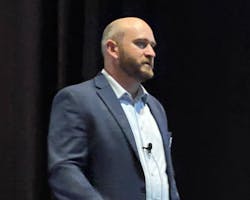The Lighting Controls Revolution is Here
With all that’s happened with LED technology over the past 20 years, the lighting industry is certainly no stranger to revolutionary change. But electrical contractors and other lighting professionals need to be ready for another technological wave now starting to hit the industry – the expansion of PoE (Power Over Ethernet) wiring systems into adjacent building technologies, including HVAC and security.
In his presentation on Day 3 at NECA, “How Lighting Controls Can Revolutionize Service and Maintenance,” Collin Weiner, president of CalEnergy Corp., said he expects the growth of digital power systems to challenge the industry in many ways. While PoE has been used in the lighting industry for several years, the newest rendition of it, X-oE, can handle up to 120W, a significant jump over the previous UPoE+ and its 90W capacity.
The new Class 4 FMPS technology accepted into the 2023 National Electrical Code (NEC) can handle up to 450V AC or DC – 20 times more than Class 2 systems of up to 2,000W over 2000 meters. The cables, which can carry data or power to devices, must have copper conductors of 6 AWG to 24 AWG and in most cases conduit is not required. Several large construction projects utilized digital power and PoE, including the Circa Hotel & Resort in Las Vegas, Hard Rock Stadium in Miami and the Sinclair Hotel in downtown Fort Worth, Texas.
One of the challenges with this new technology for NECA members is that because it’s low-voltage cabling, the jobs specifying it are open to both union and non-union electrical contractors. Weiner recommends that NECA member contractors build up a robust portfolio of lighting services and expertise to clearly separate themselves from other low-voltage contractors who may be bidding on the same job.
Weiner told the audience that the after-sale service contracts that electrical contractors can sell to building owners who install PoE lighting control and other types of digital power can be lucrative business that will enhance the value of their contracting firms. These service agreements can include an extended warranty and scheduled on-site service visits and remote 24-hour service of the systems.

